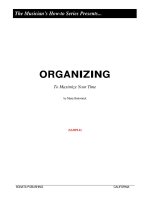30 Minutes to manage your time better pot
Bạn đang xem bản rút gọn của tài liệu. Xem và tải ngay bản đầy đủ của tài liệu tại đây (360.5 KB, 65 trang )
Apart from any fair dealing for the purposes of research or private study, or criticism or review, as permitted under the relevant copyright,
designs and patents acts, this publication may only be reproduced, stored or transmitted, in any form or by any means, with the prior
permission in writing of the publishers.
... To Manage Your
Time Better
354 prelims.p65
1
12/06/00, 15:08
This page intentionally blank
354 prelims.p65
2
12/06/00, 15:08
... To Manage Your
Time Better
Tony Atherton
354 prelims.p65
3
12/06/00, 15:08
First published 1999
Apart from any fair dealing for the purposes of research or
private study, or criticism or review, as permitted under the
Copyright, Designs and Patents Act 1988, this publication may
only be reproduced, stored or transmitted, in any form or by
any means, with the prior permission in writing of the publishers,
or in the case of reprographic reproduction in accordance with
the terms and licences issued by the CLA. Enquiries concerning
reproduction outside these terms should be sent to the publishers
at the undermentioned address:
Kogan Page Limited
120 Pentonville Road
London N1 9JN
© Tony Atherton, 1999
The right of Tony Atherton to be identified as the author of this
work has been asserted by him in accordance with the Copyright,
Designs and Patents Act 1988.
British Library Cataloguing in Publication Data
A CIP record for this book is available from the British Library.
ISBN 0 7494 3056 7
Typeset by JS Typesetting, Wellingborough, Northants
Printed and bound by Clays Ltd, St Ives plc
354 prelims.p65
4
12/06/00, 15:08
CONTENTS
1 Being Effective
1
2 Where Does Your Time Go?
Raising your awareness of time 6; Now
decisions: the Maltese Cross dilemma 8; Time
log 11; Reactive or proactive 12
5
3 Things Important to You
Goals and tasks 15; Deciding priorities 19; To Do
lists 24; Reactive tasks 25
13
4 Scheduling
Do the As 28; Prime time 28; Diaries and
organizers 31
27
5 Interruptions
Personal interruptions 37; Telephone
interruptions 42
37
6 Getting Organized
Office or work area 45; Communications 48;
Meetings 49; Delegation 50; Other time robbers
51; Saying ‘no’ 52; Conclusion 53
45
7 Summary
The habits 54; Additional tips 55
54
354 prelims.p65
5
12/06/00, 15:08
The 30 Minutes Series
The Kogan Page 30 Minutes Series has been devised to give your
confidence a boost when faced with tackling a new skill or challenge for the first time.
So the next time you’re thrown in at the deep end and want to
bring your skills up to scratch or pep up your career prospects,
turn to the 30 Minutes Series for help!
Titles available are:
30 Minutes Before a Meeting
30 Minutes Before a Presentation
30 Minutes Before Your Job Appraisal
30 Minutes Before Your Job Interview
30 Minutes To Boost Your Communication skills
30 Minutes To Brainstorm Great Ideas
30 Minutes To Deal with Difficult People
30 Minutes To Get Your Own Way
30 Minutes To Make the Right Decision
30 Minutes To Make the Right Impression
30 Minutes To Market Yourself
30 Minutes To Master the Internet
30 Minutes To Motivate Your Staff
30 Minutes To Plan a Project
30 Minutes To Prepare a Job Application
30 Minutes To Succeed in Business Writing
30 Minutes To Write a Business Plan
30 Minutes To Write a Marketing Plan
30 Minutes To Write a Report
Available from all good booksellers.
For further information on the series, please contact:
Kogan Page, 120 Pentonville Road, London N1 9JN
Tel: 0171 278 0433 Fax: 0171 837 6348
354 prelims.p65
6
12/06/00, 15:08
Being Effective
·
1
BEING EFFECTIVE
Life is too short to let even one day
be frenzied or frazzled or frittered away.
Life is too short not to take time to do the things that
will hold the most meaning for you.
Verse on a Hallmark Greetings Card
Time – the eternal problem! As a child, you have time to
fill and ‘nothing to do’, and as an adult, you have too much
to do and too little time to do it in.
Is time management the panacea to this adult problem,
or is it just a myth about lists, lists and more lists? Time
management is not about clock-watching, nor is it about
timing everything to the nearest minute – even 30 minutes.
In a sense it is not even about managing time – it is about
managing yourself.
Time management may demand a change in your attitude towards your life and work and the things you want
to do. In return, it will help you to regain control over your
1
354(01).p65
1
12/06/00, 15:10
·
30 Minutes . . . To Manage Your Time Better
work and life by recognizing what is really important and
what is not, and by doing the important things instead of
the unimportant ones.
To use the principles of time management you need to
know what the really important things are in your life and
at work and give them a high priority – and that includes
your home and family. Of course, other things will intrude,
but your task is to recognize the intruders you do not want
and control them so that they do not take over. If you can
answer the following questions then you are on your way
to being a good time manager.
What are the most important things you want to do:
n today;
n this week;
n this month?
There are a few core time management skills to learn and
master. They are easy to use but it takes perseverance to
keep on using them, day in and day out, and turn them
into habits. You may need to crush old habits and build
these fresh skills into a new and permanent way of working. Only then will you reap the benefits in full.
As well as the core skills many other suggestions are
given in this book. Some will be important to you and some
not. Choose according to what suits you and your work.
Gradually building new habits is the key to success, but
there are three cheering lessons to learn right now:
n You are not alone. Surveys repeatedly show that employ-
ees are working longer and longer and want to break
from this habit.
2
354(01).p65
2
12/06/00, 15:10
Being Effective
·
n You cannot do everything. If you do the important things
‘they’ will not worry too much about the unimportant
ones, and neither should you.
n Feeling more in control reduces stress. These habits will
put you back in control.
How much more effective will you be? To estimate how
well you manage your time now, try the quiz below. Then,
after using the principles outlined in this book for about a
month, do the quiz again. It does not matter much what
you score the first time around but you should find that
your score increases by 10 to 20 points after a month. The
average increase is about 15. However approximate the
measure, it is a very significant result.
Time Management Quiz
Rate yourself, from 0 (poor) to 5 (excellent):
1 I am absolutely clear about what is important to me.
2 I have clear goals at work, in line with my performance
objectives.
3 I prioritize all my work goals.
4 I feel in control of events at work.
5 I use a few minutes to plan each week and day.
6 I stick to the important tasks throughout the working
day.
7 I recognize tasks that are not really important, even
when they are urgent.
8 I force myself to make time for the important things.
9 I often say ‘no’ to tasks that are not really important, or
not really my job.
3
354(01).p65
3
12/06/00, 15:10
·
30 Minutes . . . To Manage Your Time Better
10 I recognize trivia, and deal with it quickly and effectively.
11 I control interruptions, including telephone calls, really
well.
12 My work area/office is well organized, I find things
when I want them.
13 There is harmony between my private life and ambitions and my work.
14 I do not forget commitments I have made, and I complete them.
15 When I commit time to something, I know it will be
available.
16 My diary/organizer, whether paper or electronic, is
indispensable to me.
17 I get home at a sensible time and only take work home
if I choose to.
18 I keep my stress to a manageable level.
19 I have quite precise definitions of key things I want to
achieve.
20 I prioritize the day’s tasks every day.
Total (out of 100): Now:
After one month:
Improving your personal effectiveness by using time management techniques is not difficult but it does need tenacity.
Some people have likened it to losing weight: you know
what to do – make a permanent change to your diet – but
will you do it? It is the same with time management. This
book will tell you what to do. Your challenge is to make
the permanent changes to the way you work, little by little,
over the next few weeks. Be firm with yourself and build
these new habits, starting now.
To choose time is to save time. (Francis Bacon)
4
354(01).p65
4
12/06/00, 15:10
Where Does Your Time Go?
·
2
WHERE DOES
YOUR TIME GO?
There are 168 hours in every week but some weeks it feels
as if we have been short-changed. Where did the time go?
What have I done today? These are familiar questions to
millions of people.
The answers revolve around five things you can do. We
will look at how to do them in the rest of the book. The
five things are:
Develop your awareness of the importance of your time
and how you use it.
2 Know what the really important things are that you
want to do, in your private life and at work.
3 Give those things a high priority and mean it.
1
4
Ensure that your priorities get the time they need, while
being pleasant and helpful to others and playing your
full role in the team.
5
354(02).p65
5
12/06/00, 15:11
·
30 Minutes . . . To Manage Your Time Better
Recognize what and who steal your time and deal with
them pleasantly but effectively.
Diaries and organizers are important, vital for many people,
but not as important as your attitude to making good
use of your time. Without an attitude of caring about, and
being aware of your use of time, no diary will solve your
problems.
5
Raising your awareness of time
The first step to developing awareness of the importance
of your time is to know where time goes. Knowing this is
also the first step to controlling it better. Despite the saying
‘time is money’, time is not money. You can usually earn
more money and spend less if you really want to. With
time, you cannot earn more and you cannot use less. It
comes – and goes – at the same old rate, whatever you do.
Try thinking about a 24-hour day as having four classes
of time (see Figure 2.1). Some activities could naturally fall
under more than one classification. That does not matter.
For many people it is the competition between work time
and the others that is the problem that has to be solved.
Classifications of the 24-hour day
n Health time: the time you need to keep yourself healthy
– sleeping, eating, resting, exercising, spiritual time.
n Work time: the time you sell or give to other people –
your employment, charity work, scouts, guides and so
on.
n Family time: the time you devote to your family and
home.
6
354(02).p65
6
12/06/00, 15:11
Where Does Your Time Go?
Family
·
Health
Recreation
Work
Figure 2.1 Classifications of time: the 24-hour day
n Recreation time: the time you use as you wish, by your-
self or with others, for recreation, relaxation – sports,
television, reading, etc.
Many people feel pressured into spending more time at
work, sometimes to the insane level of competing with
one another to see who can stay the longest. Quite simply,
more time at work means less time for health, family and
recreation.
This problem often starts with creeping assaults on your
recreation and family times. They shrink. You get home
later or leave earlier in the morning. Is this wrong? That is
up to you. Do you really want to spend less time with your
family and friends and more time at work? Or is now the
time to ask yourself: ‘What do I really want to do?’
As work takes up ever more hours, eventually your
health time is attacked. You skip lunch or eat a sandwich
at your desk. You skip breaks. You lose sleep. Your work
suffers and eventually your health suffers. Now it is
serious. Continue like this and you could be on the way to
a heart attack, a mental breakdown or a divorce – or even
all three. It happens to real people like you.
7
354(02).p65
7
12/06/00, 15:11
·
30 Minutes . . . To Manage Your Time Better
Has there ever been a deathbed confession that said: ‘I
should have spent more time at work?’
Of course, work pressures are real. You have to earn a
living. You have bills to pay and a mortgage. Less pressured
jobs are not easy to find.
To regain control you must decide, given your circumstances, to be more aware of how much time should be
devoted to your health, family, work and recreation. Consider this carefully. Do you work a lot of unpaid overtime
every week? What has happened to your life? What are
your real priorities?
Surveys suggest that some managers work at least 15
hours a week more than their contract requires. That is
equivalent to an extra two days a week. What would your
boss say if you gave a customer an extra 40 per cent free
– every week?
Now decisions: the Maltese Cross dilemma
Time management is about improving effectiveness by
doing the right things – the important things – at the
right time and at the expense of the unimportant. It is not
normally about improving efficiency. That can be a later,
separate task. There is little point in being super-efficient
if you are doing the wrong things in the first place.
Every day we make innumerable decisions about what
to do next, that is, what to do ‘now’. Success hinges on our
ability to put the important things first on most of those
8
354(02).p65
8
12/06/00, 15:11
Where Does Your Time Go?
·
Reactive
events/
crises
Routine
chores/
tasks
NOW
Time
robbers
Proactive
planned
tasks
Figure 2.2 The Maltese Cross dilemma: the demands on your
time
dozens or hundreds of occasions every day when we decide
‘what to do now’. We can plan for the future, we can reminisce about the past, but we make decisions now.
At work, four broad types of events compete for your
attention at that moment called ‘now’. These are represented as a Maltese Cross in Figure 2.2. Control these when
deciding what to do ‘now’ and you will not need to do an
extra 15 hours of unpaid overtime every week.
Proactive planned tasks are the important things you plan
to do. They should stem from your work and personal
goals, or objectives, or whatever you want to call them.
These tasks move you or the company forward.
9
354(02).p65
9
12/06/00, 15:11
·
30 Minutes . . . To Manage Your Time Better
Routine chores and tasks that will only take a few minutes
and now might be a good time to do them. Doing them
will never move you forward but ignoring them will hold
you back. They are chores, like filing, and they can gobble
up time if you are not careful.
Reactive events, mini-crises happen all around you every
day. You could lend a hand right now. They are not your
responsibility but you like to help.
Time robbers ambush you. Someone tells you about his
or her holiday, or you need to ask someone, again, to show
you how to do a tricky job.
Why is there never enough time for the important
planned events? You know why – it is because you spend
too much time on the other three arms of the Maltese Cross.
Every hour spent doing the chores, or showing you are
very helpful, or listening to gossip is an hour less for the
important things. Of course there must be some time for
these other things. Chores must be done. You need to be
co-operative. Working without social interaction would be
unbearable. Do these things but raise your awareness of
the importance of your time and learn to control the time
given to less important things. Or continue working an
extra 15 hours of unpaid overtime every week. The choice
is yours.
Remember, it is achieving your goals – the important
things that really matter – that determines your achievements, career progress and how much time you spend at
work, not chit-chat and chores. Even when achieving your
goals you should devote time to the most important ones.
You may have to compromise lesser goals to make time
for the major ones.
10
354(02).p65
10
12/06/00, 15:11
Where Does Your Time Go?
·
Spending too much time on less important things
=
Working late to catch up on more important ones.
Time log
So where does your time go? Estimate or measure it against
the four arms of the Maltese Cross. It is not exciting but
the rewards are worth the effort. Try logging your time for
a period. The results could surprise you and at least you
will have accurate information on which to base some
decisions.
Tips
n Overcome differences between days and weeks by
logging your time for Monday of one week, Tuesday
of the next, and so on.
n Use classifications that are important to you, maybe the
four arms of the Maltese Cross, or the four segments
of the 24-hour cycle in Figure 2.1, or interruptions/
telephone calls/meetings/tasks, etc.
n Do not estimate times at the end of the day, you will be
more accurate if you make notes every half-hour or
hour through the day.
You may be surprised, even shocked, at what you discover.
Once you have your facts, you can examine them critically
and decide what you need to change. This book will give
you plenty of ideas about how to change, but only you
can decide what to change.
11
354(02).p65
11
12/06/00, 15:11
·
30 Minutes . . . To Manage Your Time Better
Reactive or proactive
Every job demands that we react to events around us (the
events and crises in the Maltese Cross) but employers
expect us to shape events as well, to be proactive. Only
one arm of the Maltese Cross is devoted to proactive tasks.
To be more proactive and less reactive you need to spend
more time on the planned activities and less on reacting to
events, time robbers, routine tasks and chores. Be more
proactive in how you use your time.
How proactive are you now? On the scale shown in
Figure 2.3, mark where you feel you are at present between
being totally proactive and totally reactive. Then mark
where you would like to be. It is nearly always more to
the right. That is your target. Make the shift in the next
month, two at the most.
No
Tar
g
w
2
6
et
4
8
10
0
Reactive
Proactive
Figure 2.3 Proactive versus reactive
12
354(02).p65
12
12/06/00, 15:11
Things Important to You
·
3
THINGS IMPORTANT
TO YOU
For many people the demands of work thwart private
ambitions. You have wanted to climb a mountain in Africa,
or do a long-distance walk, but you have not had the time.
Important jobs at work are rushed because there is no time.
The truth is that you have had the time, 168 hours a week
just like everyone else. You have simply given higher priority to other things.
If other things take over from private ambitions or work
objectives then a planning technique that puts important
things in their rightful place will be useful. Either that or
forget them.
Of the four arms of the Maltese Cross (Figure 2.2, page
9) the one that brings the richest rewards is that for proactive planned tasks. Good planning followed by good
action should enable you to do more of the things that are
important to you.
13
354(03).p65
13
12/06/00, 15:14
·
30 Minutes . . . To Manage Your Time Better
In reality however, your success depends on how you
decide what you will do ‘now’. Most people are easily
blown by the wind of events into doing whatever seems
to be expected of them by others or by what seems urgent,
even if not particularly important. They may have a ‘to
do’ list or use yesterday’s list, but it gets scant attention
after the first few moments because it is events that dictate
their day. At the end of the day they are left wondering,
‘What have I achieved today?’
It is trite, but planning begins by deciding what is
important. When John F Kennedy announced that the
United States was going to put a man on the moon and
bring him back safely to earth by the end of 1969, he laid a
goal before the US people and US industry. That goal
had two important aspects: it specified what was to be
done and it specified when it had to be completed. You
need both of these, the what and the when, in your own
planning.
Planning is a straightforward process, but it needs to
become a habit:
n Decide what is important to you, your goals.
n Prioritize these goals and set sensible deadlines.
n Break down each goal into subordinate tasks, with
deadlines.
n Schedule those tasks to specific months.
n Write a new ‘to do’ list every day or week, including:
–
proactive items from the month’s tasks (from your
important goals);
–
other tasks or chores that must be done.
14
354(03).p65
14
12/06/00, 15:14
Things Important to You
·
n Start each day with two or three minutes’ planning
time.
n Schedule your week and day, allowing spare time to
react to some unexpected events and crises.
Goals and tasks
Goals are those important things you want to achieve,
whether at work or in your private life. They are the things
that move you and the company forward rather than
simply prevent you from slipping back. They are almost
certainly too big for you to just go out and do them there
and then. They will need to be broken down into their parts
(the tasks) and you need to decide when you are going to
do those tasks – the week or month will probably do at
this stage.
Example: Suppose you want to make a will
It is unlikely that you could simply sit down and write a will
that would meet any legal problems that might arise. You
may decide to use a solicitor and for that you will need an
appointment. You may also want to discuss your will with
your spouse, maybe with other people as well. Perhaps you
want to consider various people’s feelings and sentiments
towards some of your possessions. All of these tasks take
time and thought. So it is with all goals.
Many people find private goals harder to achieve than
work goals. At work, if you make no progress, someone is
likely to push you by asking awkward questions. In your
15
354(03).p65
15
12/06/00, 15:14
·
30 Minutes . . . To Manage Your Time Better
private life you have to push yourself. A good planning
method will serve to pressure you into achieving your
private goals.
Don’t like goals
Quite a lot of people do not like the concept of goals. They
see them as being overly organized or restricting spontaneity. While that can be true it is usually a misconception.
If you do not like ‘goals’ call them something else. A goal
is simply one of those things that you really want to do. In
the words of the poem at the beginning of Chapter 1, they
are ‘the things that will hold the most meaning for you’.
But give them a deadline or they may never happen.
Your goals
What were you doing five years ago? What job did you
have? Who were your friends? What was work like then?
What was life like then? Does it really seem like five years
have passed? What have you achieved since then?
Five years from now, what will you have achieved? That
is where your goals come in.
Think ahead using the four questions which follow.
Brainstorm the answers. Write them down in four groups
without (at the moment) judging how practical you think
they are. Judge that later.
1
In your private life: what are the really important things
you want to achieve in the next few years?
2
In your career: what are the really important things you
want to achieve in the next few years?
16
354(03).p65
16
12/06/00, 15:14
Things Important to You
·
3 In your private life: what are the really important things
you want to achieve in the next few months?
4 At work: what are the really important things you want
to achieve in the next few months?
Now bring judgement into play. Do you really mean these
things? Will you commit the time to achieve them? If there
are any that you are not committed to, cross them off now.
Then combine the lists and decide the priorities. Select your
top priorities and keep this list somewhere safe, preferably
in your diary or organizer.
Key Habit: Know what you want to do – your goals – and
plan how and when to do them.
Split your goals into tasks
Treat your most important goal as you would a work project. (Later, do this for your other goals.)
n Define the goal more specifically if that will help.
n Decide when you want it to be completed. Be precise.
n Break down each goal into the tasks or steps that are
needed to complete it.
n Arrange the tasks in the sequence in which they will
have to be done.
n Give each task a deadline, just the month might do for
now.
17
354(03).p65
17
12/06/00, 15:14
·
30 Minutes . . . To Manage Your Time Better
Example: Cycle to Spain
Goal:
For the fun of it, to cycle from the north coast of France to
Spain and return by ferry, next October (assume it is now
April).
Tasks:
n Telephone doctor to arrange a medical: Tomorrow
n Plan a fitness programme, visit gym to seek advice:
Saturday
n Buy good maps of France and Northern Spain: Saturday
n Get ferry timetables from travel agent: Saturday
n Start cycling fitness programme: Sunday
Targets:
May: 15 miles per ride
June: 25 miles per ride
July: 35 miles per ride
August: 50 miles per ride
September: 70 miles per ride
n Learn cycle maintenance from a friend: May
n Calculate time needed, including rest days; book leave,
book ferries: May
n Start gym fitness programme: end May
n Plan route; get details of small hotels in France and
Spain: June
n Decide on kit needed; buy kit: June
n Have bike checked out; buy spares: September
n GO! October
18
354(03).p65
18
12/06/00, 15:14









